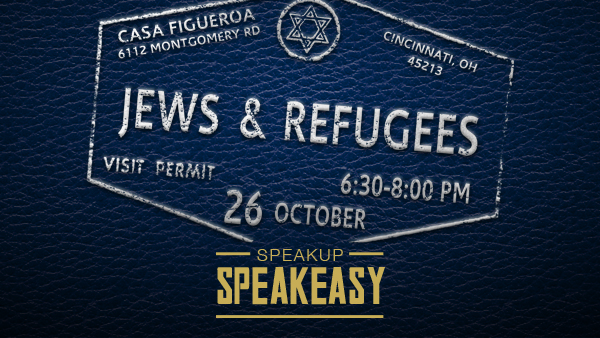
‘Then They Came for Me:’ Speak Up Speak Easy to Talk Jews and Refugees Today
Then they came for the Trade Unionists, and I did not speak out— Because I was not a Trade Unionist.
Then they came for the Jews, and I did not speak out— Because I was not a Jew.
Then they came for me—and there was no one left to speak for me.
—Martin Niemöller
I will never forget the first time I read this poem. I was in the 7th grade, and my teacher had just begun the Holocaust unit. Being Jewish myself, I assumed my knowledge in this area far surpassed that of my classmates, and I thought it would be a good opportunity to excel and raise my grade before report cards went out. However, this was a combined history and writing class, and our curriculum warranted a more creative and literature-centered approach than I was used to.
This poem was the first item we discussed. Somehow until that point, I had never seen the piece and clearly still had plenty to learn. That semester my Holocaust education grew exponentially as we recalled the painful stories of my people. Forced to leave their homes, losing loved ones along the way, their lives were stolen, and each time I read a new story, I found myself drawing back to the Niemöller poem.
At the time I hadn’t heard much of “Trade Unionists” or even “Socialists,” but the message was not a difficult one for any of us to grasp. My teacher told the class, “We have seen the atrocities humans are capable of when they allow fear to overtake their voices. Lesson learned. Never again.”
As an American Jew growing up mostly in the 2000s, it never occurred to me that the poem wasn’t simply meant to shed light on the perceived historical significance of antisemitism, but was also intended to warn against bystander behavior in future situations—situations I didn’t believe could ever take place again. At the blissful age of 13, I was sure that kind of hate ended with the Holocaust. I was still learning.
Like before the Holocaust, fear, anger, and unfamiliarity are in the air today, especially as it relates to those fleeing persecution. Many defend strict refugee policies; others want to open up the borders to asylum seekers. Whatever the position, the question we as Jews face now is, should our past as asylum seekers influence the way we treat current asylum seekers? Jewish people have asked and continue to ask themselves this question. It is a complicated one. Fortunately, like most Jewish topics, it’s all up for discussion.
Please join us for the next Speak Up Speak Easy event Jews & Refugees.
We will take a look at this topic from a number of angles, offering unique opinions while keeping an open mind to new ones.
Camp Livingston Executive Director Max Yamson will share his personal refugee story, and Robyn Lamont and Maia Morag will give compelling perspectives sure to provoke thinking and conversation.
Please join us at Casa Figueroa on October 26 at 6:30 PM for this fun and important discussion! Space is limited, so register here in advance.

